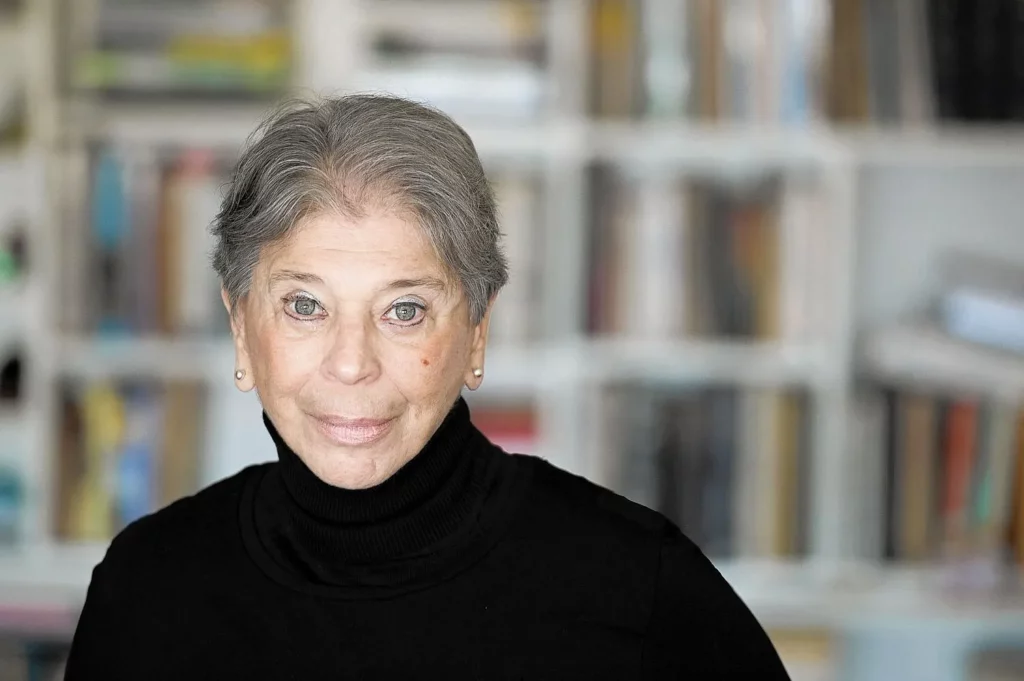
Vivian Gornick. Photograph by Mitchell Bach. Courtesy of Farrar, Straus and Giroux.
“I could hardly believe my luck in having found her,” Vivian Gornick writes of the persona she created for her pivotal 1987 book Fierce Attachments, a rich, genre-redefining portrayal of fraught maternal bonds that the New York Times has anointed the best memoir of the past fifty years. “It was not only that I admired her style, her generosity, her detachment—such a respite from the me that was me!—she had become the instrument of my illumination.” That shock of wonderment and good fortune is familiar to all Gornick’s readers, and especially to the many writers of nonfiction who still pass around The Situation and the Story (2001)—in which those words appear—like a talisman. It’s a thrill to read Gornick’s precise, elegant account of how a voice and a narrative are made, and to see that process so masterfully demonstrated in her own work is often (as she herself has said of reading and rereading the likes of Edmund Gosse or Joan Didion) to become “enraptured.”
It’s in that spirit that the Review will present Vivian Gornick with the Hadada, our award for lifetime achievement, at our seventieth-anniversary Spring Revel on April 4, 2023. Her engrossing Writers at Work interview, which appeared in issue no. 211 (Winter 2014), was the magazine’s second ever to focus on the art of memoir.
Gornick’s exceptional contributions to literature over the past several decades span autobiography, essays, and journalism. Her first book, In Search of Ali Mahmoud: An American Woman in Egypt—the research and writing of which she described, with characteristic élan, for the Review’s short documentary series My First Time—was a finalist for the 1974 National Book Award. As a contributor to The Village Voice in the years that followed, she became a leading writer of the feminist movement while developing a unique style of criticism that blended literary analysis with clear-eyed observations of her own experiences. This style came to fruition in books including The End of the Novel of Love (1997), a groundbreaking collection of essays that debunked the insidious ubiquity of romantic love as a metaphor for happiness, and The Men in My Life (2008), a compassionate study of the struggle for inner freedom that is shared across genders.
A piece adapted from her 2020 book Unfinished Business: Notes of a Chronic Re-Reader, was published on our website, as was her introduction to Taking a Long Look: Essays on Literature, Culture, and Feminism in Our Time, a 2021 selection of work from throughout her career. And in issue no. 204 (Spring 2013), the Review published “Letter from Greenwich Village,” Gornick’s essay on her long friendship with a fellow New York City flaneur. It was selected for The Best American Essays 2014 and became the opening chapter of The Odd Woman and the City (2015), a brilliant ode to the place where she has spent her life.
“Vivian Gornick chronicles the vicissitudes of friendship, the accomplishments and still unrealized work of the feminist movement so far, the textured joys, terrors, and longings of living alone,” Mona Simpson, the Review’s publisher, says. “She writes about getting old. She writes about failure. Had someone described the totality of Gornick’s books to me before I’d read them—a series of essays and memoirs in continuous first-person, without the friction of a second sensibility to come up against, with no threat or hope of a love-story ending—I would guess that I’d have felt claustrophobic, drowned out. But there are I’s and there are I’s. Gornick, like her admired Sebald, pulls off her enormously ambitious interior project—with brash, deep humor, and with a burning interrogation of the many selves she was before this one, here and now, the one talking to us from the page.”
Over the course of her illustrious career, Gornick—whose work has also appeared in the Times, the Nation, The New York Review of Books, The Atlantic, and many other publications—has received the Windham-Campbell Prize, a Guggenheim Fellowship, and a Harvard University Radcliffe Institute Fellowship. We are truly delighted to honor her with the Hadada, whose previous recipients include Joan Didion, Philip Roth, Lydia Davis, and Jamaica Kincaid.
Since 1953, The Paris Review has provided a vital space in which the most daring and beautiful writing and visual art of the day can flourish, enchanting our readers around the world. At this very special 2023 Spring Revel, writers, artists, and friends will raise a glass to seventy years of the Review, to the winners of the Plimpton Prize and the inaugural Susannah Hunnewell Prize (to be announced), and to the incomparable Vivian Gornick. Tickets and tables are now available, and all proceeds help sustain the magazine. We can hardly believe our luck—and we hope you’ll join us.
from The Paris Review https://ift.tt/mcD403b
Comments
Post a Comment